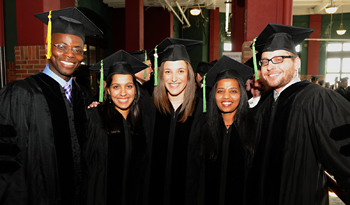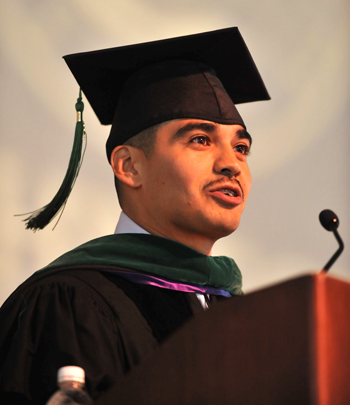Medical School Graduates Transition from Students to Physicians
 |
|
After four years spent training and learning all of the skills necessary to become practicing physicians, the 174 members of the Northwestern University Feinberg School of Medicine Class of 2011 celebrated their graduation on May 19. |
On May 19, after four years spent training and acquiring skills they will use as practicing physicians, the 174 members of the Feinberg Class of 2011 celebrated earning their Doctor of Medicine (MD) degrees with family, friends, and faculty mentors at their graduation, held at Chicago’s Navy Pier Grand Ballroom.
Feinberg Interim Dean Jeff Glassroth, MD, set the stage for the event, reminding the 152nd graduating class that the transition from student to physician brings considerable responsibility — an experience with a steep learning curve that will also prove exciting and invigorating.
Glassroth went on to say, “You will participate in times of great happiness as antibiotics cure serious infections, as surgeries go well, and as babies are born. But, you will also see great sadness as unwelcome diagnoses are presented. I am confident that your Feinberg education has prepared you to fulfill all of these responsibilities to your patients.”
In his remarks, University President Morton O. Schapiro, PhD, reminded the graduates that this was a day that they had long been preparing for.
“I can see the pride in the eyes of your parents and families, and I am extraordinarily proud to be here in your presence,” he said.
During the ceremony, Robert Hirschtick, MD, associate professor in the Feinberg Division of General Internal Medicine, received the 2011 George H. Joost Award for teaching excellence. In his award acceptance, Hirschtick emphasized what a privilege it has been working with the students at the VA Medical Center, adding, “As a group, you are sharp and enthusiastic and motivate me to stay the same.”
In his presentation of the award, Class President Darren Boyd, MD ’11, described Hirschtick as a “faculty member who truly wants to see you succeed.” Boyd, who was also honored with the Kenneth M. Viste, Jr., MD ’66 Student Service Recognition Award, will join 31 classmates at the McGaw Medical Center of Northwestern University to complete his residency training in internal medicine.
Following the distribution of the faculty award, Sherwin Nuland, MD, clinical professor of surgery and fellow of the Institution for Social and Policy Studies at Yale School of Medicine, offered the convocation address. In his speech “The Silent Influence,” Nuland encouraged graduates to rededicate themselves to their personal humanity — the essence of what will enable them to look into the eyes of the sick and bring them hope.
“Just as your charge as physicians entails the highest responsibility to which a human being can aspire, it also entails the highest privilege; the privilege of serving the highest good, the good of humanity,” Nuland said. “We must rededicate ourselves to the most basic basic: caring. Healing is an art that uses science to restore the normal rhythms of nature. Always remember that it requires both wisdom and compassion.”
The advice offered in Nuland’s address served as the final lesson for the Class of 2011. It was now time for Glassroth, along with University Provost Dan Linzer, PhD, to distribute diplomas, while college mentors hooded each graduate, signifying their transition from student to doctor.
During the conferring of degrees, 13 graduates were honored with academic distinctions in research. In addition, 11 students graduated with a joint MD/Master of Public Health (MPH) degree, six with an MD/Master of Arts in Medical Humanities and Bioethics degree, and nine others from the Medical Scientist Training Program received combined MD/PhD degrees.
 |
|
Class speaker Juan Bautista, MD ’11, reminded his classmates to retain the core values of work ethic, altruism, and gratitude as they embark on their new chapter as physicians. |
Following the traditional hooding ceremony, Juan G. Bautista, MD ’11, addressed the convocation as the class speaker — selected for this role by the deans of the medical school, as well as his peers in the Student Senate. The event was bittersweet for Bautista and his wife, who will soon move their young family West as he pursues an obstetrics and gynecology residency at his hometown hospital, the University of California, San Francisco-Fresno.
In his reflections, Bautista focused on three core values that he strives to exemplify as a father and a physician: work ethic, altruism, and gratitude. He described the extra steps his classmates have taken to showcase their dedication — one spending four years away from her husband to complete her schooling and another leaving a successful career to fulfill a dream of helping others. He stressed the importance of giving back to educational institutions, the less fortunate, and the field of medicine. And he encouraged his peers to give thanks for the support of family and friends, and to show their appreciation with smiles, positive attitudes, and a commitment to future generations.
To conclude the ceremony, the graduates recited the physician’s oath — the same oath they took as first-year medical students — pledging to maintain by all means in their power “the honor and the noble traditions of the medical profession” and always considering the health of their patients first and foremost.
Upon departing the ceremony, the Class of 2011 gathered with Interim Dean Glassroth, who led a traditional champagne toast that celebrated their achievements and marked the beginning of the next phase of their lives: their new journey as physicians.
Public Health Celebrations
The Feinberg Program in Public Health held its own graduation celebration on May 18 for 30 students earning MPH, Master of Science in Epidemiology and Biostatistics (MSEB), or combined MD/MPH degrees. In addition to offering an inspirational address from keynote speaker Bechara Choucair, MD, adjunct associate professor of family and community medicine and commissioner of the Chicago Department of Public Health, the event also served to recognize the winners of the Public Health Innovation Conference. The program — developed by MSEB graduates Umakanth Avula, MS ’10, and Munir Pathak, MS ’10, in collaboration with Denise Scholtens, PhD, associate professor in preventive medicine and neurological surgery — offers students an opportunity to present innovative public health ideas to their peers and faculty. Awards went to the following students:
- First prize: Christopher E. Wilmer for his work, “Clean Drinking Water in Developing Countries Via Solar Disinfection – An Inexpensive Quality Control Mechanism.”
- Second prize: Emery Lin for his work, “Collaborative Care: A Model for Using Short-term Medical Trips to Create Sustainable Healthcare Improvements.”
- Third prize: Holly DeMark Neumann for her work, “Human Papillomavirus (HPV) Vaccination and the Policy of Preventing Disease.”





